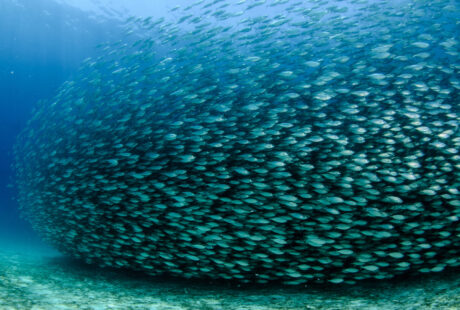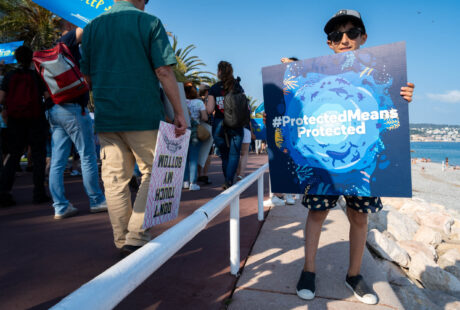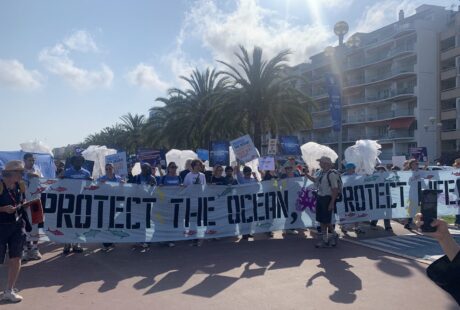EU Member States are set to miss targets to protect 30% of EU seas by 2030, warn marine NGOs Oceana and Seas At Risk. In reaction to the EU’s interim evaluation of its 2030 Biodiversity Strategy released on 13 March, the NGOs are today publishing an assessment of Member States’ pledges on marine protection targets. As well as not being on-track to meet the 30% target, EU countries are also far behind in achieving their commitment to strictly protect 10% of European seas by 2030. The NGOs’ evaluation also shows low ambition to deliver agreed marine protection commitments. Faced with the dual biodiversity and climate crises, the European Commission cannot ignore this alarm signal and must take firmer action for the EU to meet its biodiversity targets, and remain credible internationally vis-à-vis the recently adopted UN Global Biodiversity Framework.
Nicolas Fournier, Campaign Director for Marine Protection at Oceana in Europe, said: “Our assessment confirms political inertia on the part of many Member States to meet marine protection targets they themselves endorsed, and they already missed their targets under the previous 2010 EU Biodiversity Strategy. The environmental crisis we face requires resolute action. We call on the European Commission to make these targets legally binding as a priority for the next legislature and to dedicate adequate funding to meet them.”
Tatiana Nuño, Senior Marine Policy Officer at Seas At Risk, said: “Failure to protect our seas today will bring devastating consequences in an ever nearer future. We’re already witnessing the fallout of overfishing and the disruption of marine ecosystems. The reluctance of Member States to act jeopardises our vital resources and collective wellbeing. With ample data, expertise, and resources available, there’s simply no excuse for delays in submitting plans for marine protected areas. We urge EU countries to demonstrate genuine commitment to leading the charge in marine ecosystem protection and restoration, setting an example internationally.”
The NGO assessment focused on seven EU Member States (Denmark, Germany, Ireland, the Netherlands, Portugal, Spain and Sweden) and found that only four of them submitted pledges at all, more than a year after the deadline. Those countries that have submitted assessments are lacking the level of ambition required to tackle the EU’s environmental emergency. The scrutiny of pledges was also complicated, as only two pledges have been made public. Only one Member State (Denmark) described in its pledge how it will achieve the 30% target. Two others (Germany and the Netherlands) have already achieved this target, but have not yet submitted pledges. Portugal and Ireland are both lagging behind in terms of marine protection – with only 5% and 9% of their waters designated as Marine Protected Areas (MPAs) respectively, and yet their governments have also not submitted any pledges to the European Commission.
Of particular concern to NGOs is the lack of political will among Member States to progress on strict protection. Most countries who submitted pledges have no plan to designate strict protection areas and none of them are on track to meet the 10% EU target. Along with no-take zones where no extractive activities are allowed, strict protection is the most effective ocean conservation tool to rebuild ocean abundance and increase resilience to climate change. As unprecedented marine heatwaves hit Europe, creating strictly protected marine areas is a sound investment for fishers and coastal communities, allowing them to cope with extreme changes to come.

Current MPA coverage of EU seas stands at 12%, and strictly protected areas make up less than 1%. Despite progress in recent years, the EU will need to expand its protected area network at a significantly faster rate than it has in the last decade if it is to meet its Biodiversity Strategy target by 2030. In addition to expanding ocean coverage, it is fundamental that Member States ensure effective management of MPAs by restricting destructive human activities within them, as the designation of new MPAs alone will not guarantee the conservation of the EU’s marine ecosystems.
As a result of the EU 2030 Biodiversity Strategy, the European Commission initiated a process of ‘pledges’ asking Member States to submit information about how they plan to meet the 30% and 10% marine protection targets. Marine NGOs lament that the Commission’s interim evaluation of this strategy was considerably simplified (partly due to insufficient data reported by Member States, including pledges) and integrated into a much broader policy evaluation – the 8th Environment action programme to 2030.
Posted on: 26 March 2024



